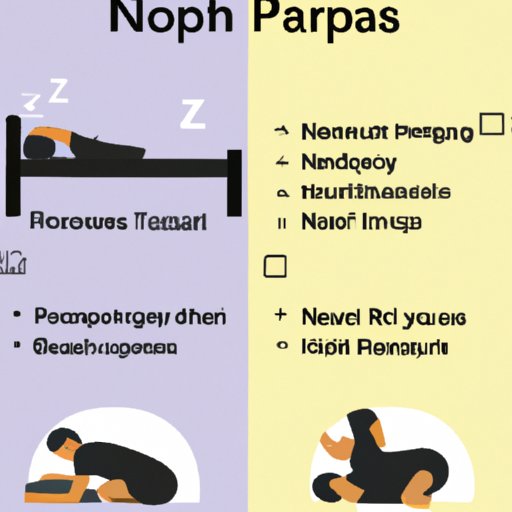Introduction
Naps have been used for centuries as a way to restore energy and focus throughout the day. But are naps healthy? This article examines the pros and cons of napping, exploring the impacts on physical and mental health, as well as cognitive performance. It also includes tips for maximizing the benefits of naps and strategies for avoiding disruptive napping habits.

Examining the Pros and Cons of Napping
Napping is defined as a brief period of sleep during the day, usually lasting between 10 and 30 minutes. It can be a great way to recharge and refresh during the day, but there are both pros and cons to consider when it comes to napping.
Benefits of Napping
The most obvious benefit of napping is feeling more alert and energized afterwards. A study published in the journal Sleep Medicine Reviews found that naps of 20 to 30 minutes improved alertness and cognitive performance in the afternoon. Naps can also help alleviate stress and improve mood, according to research from Harvard Medical School.
Risks of Napping
On the other hand, napping can lead to feeling groggy or disoriented when you wake up. It can also disrupt your nighttime sleep, making it harder to fall asleep and stay asleep. Too much napping can also lead to health problems like obesity, diabetes, and heart disease, according to research from the University of Michigan.
An Overview of How Naps Impact Health and Well-Being
Naps can have both positive and negative impacts on health and well-being. Let’s take a closer look at the effects on mental health and physical health.
Effects on Mental Health
Napping can have positive effects on mental health, particularly when it comes to reducing stress and improving mood. According to a study published in the journal Psychosomatic Medicine, taking a nap was associated with lower levels of cortisol, a hormone produced in response to stress. The study also found that naps improved overall mood, even in people who didn’t feel particularly sleepy beforehand.
Effects on Physical Health
Napping has been linked to a range of physical health benefits, including improved immunity, reduced risk of heart attack and stroke, and better blood pressure control. However, some research suggests that too much napping may be linked to an increased risk of obesity, diabetes, and heart disease, so it’s important to find a balance.
Investigating the Links Between Napping and Mental Health
Let’s now take a closer look at how napping can benefit mental health, specifically in terms of stress relief and depression and anxiety treatment.
Benefits of Napping for Stress Relief
Napping can be a great way to relieve stress and reduce feelings of anxiety. According to a study published in the journal Stress Health, taking a nap after a stressful event was associated with a reduction in cortisol levels. The study also found that napping helped participants recover better from the stressor, compared to those who did not nap.
Role of Napping in Depression and Anxiety Treatment
Napping may also play a role in treating depression and anxiety. A study published in the Journal of Clinical Psychiatry found that taking a 45-minute nap each day for one week reduced symptoms of depression and anxiety in participants. The study also found that napping helped participants feel more rested and had an overall positive effect on their mood.

How to Get the Most Out of Power Naps
Now that we’ve explored the benefits of napping for mental health, let’s look at some tips for maximizing the benefits of naps and avoiding disruptive napping habits.
Tips for Maximizing Napping Benefits
To get the most out of napping, try to keep your naps short (10-20 minutes) and consistent. Aim to nap at the same time each day, if possible. Also, make sure you are sleeping in a comfortable environment free of distractions like TVs or phones. Finally, avoid eating heavy meals or drinking caffeine just before napping.
Strategies for Avoiding Disruptive Napping Habits
If you find yourself napping too often or for too long, try setting a timer to limit your naps to 20 minutes. You can also try to stick to a regular bedtime routine and aim for seven to eight hours of sleep each night. Finally, try to avoid napping late in the day, as this can interfere with your nighttime sleep.
Exploring the Benefits of Napping for Athletes
Napping can be beneficial for athletes, as well. Let’s take a look at how napping can enhance athletic performance and some best practices for napping before and after workouts.
How Napping Enhances Athletic Performance
Napping can help athletes boost their performance by increasing alertness and energy levels. A study published in the journal Sleep Medicine found that napping for 30 minutes improved reaction time, accuracy, and overall performance in athletes. The study also found that napping increased energy levels and improved mood, which can be helpful when competing or training.
Best Practices for Napping Before and After Workouts
Before a workout, it’s best to avoid napping for at least two hours prior. After a workout, napping can help athletes recover faster and reduce fatigue. Try to keep naps short (10-20 minutes) and avoid napping late in the day, as this can interfere with nighttime sleep.

A Comparison of Daytime Napping and Nighttime Sleep
Daytime napping and nighttime sleep both offer restorative benefits, but they differ in some key ways. Let’s take a look at the advantages and disadvantages of daytime napping.
Advantages of Daytime Napping
The main advantage of daytime napping is that it allows you to fit more rest into your day. Napping for just 10 to 20 minutes can make you feel more alert and energized. It can also help alleviate stress and improve mood, according to research from Harvard Medical School.
Disadvantages of Daytime Napping
One downside of daytime napping is that it can disrupt nighttime sleep. If you nap too close to bedtime, it can make it harder to fall asleep or stay asleep. Additionally, too much napping can lead to health problems like obesity and heart disease, according to research from the University of Michigan.
The Effects of Napping on Cognitive Performance
Napping can also have an impact on cognitive performance. Here, we’ll explore the potential benefits and drawbacks of napping on memory and concentration.
Benefits of Napping on Memory and Concentration
Napping can help improve memory and concentration. A study published in the journal Neuropsychology found that taking a 90-minute nap increased performance on tests of memory and attention. The study also found that napping improved mood and reduced fatigue, which can help with concentration.
Potential Negative Impacts of Napping on Cognitive Function
However, napping can also have negative impacts on cognitive function. A study published in the journal Sleep found that napping for more than 60 minutes was associated with poorer performance on tests of memory and attention. The study also found that napping for more than 90 minutes was associated with a decrease in cognitive functioning.
Conclusion
In conclusion, napping can have both positive and negative impacts on health and well-being. It can be a great way to reduce stress and improve mood, but too much napping can lead to health problems like obesity and heart disease. To maximize the benefits of napping, try to keep your naps short and consistent, and avoid napping late in the day. Napping can also be beneficial for athletes, as it can help improve performance and reduce fatigue. Finally, napping can have positive impacts on cognitive performance, but too much napping can lead to poorer performance on tests of memory and attention.
Overall, napping can be a great way to restore energy and focus throughout the day. It’s important to find a balance between getting enough sleep and getting enough rest during the day. With the right approach, napping can be a great way to improve your health and well-being.
(Note: Is this article not meeting your expectations? Do you have knowledge or insights to share? Unlock new opportunities and expand your reach by joining our authors team. Click Registration to join us and share your expertise with our readers.)
